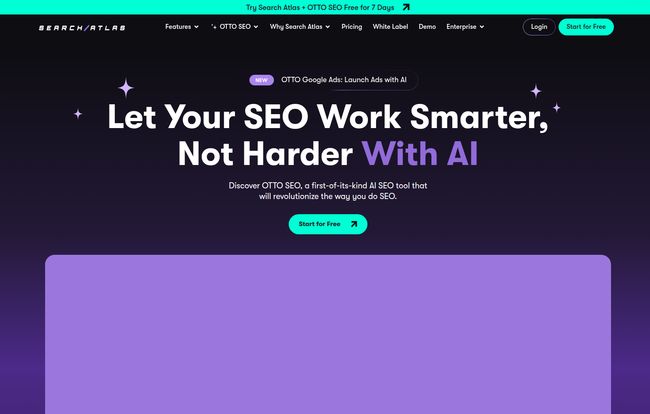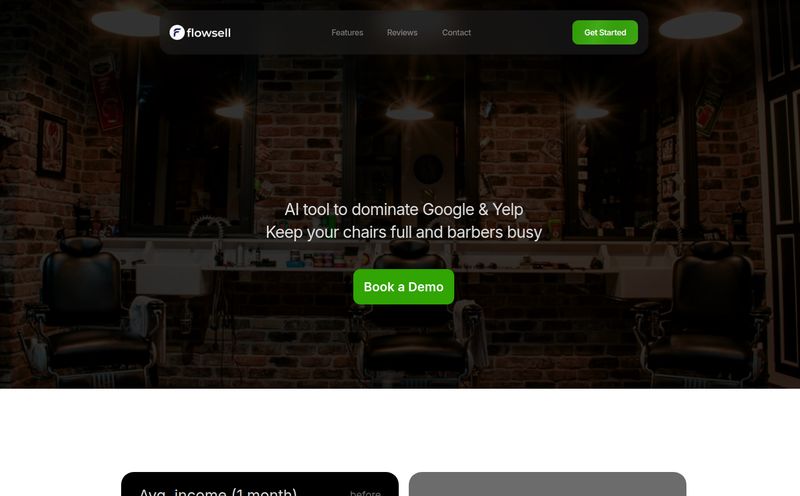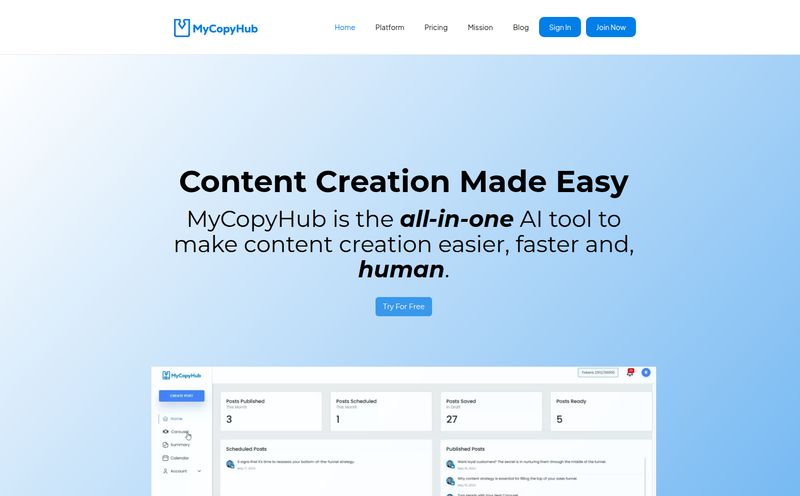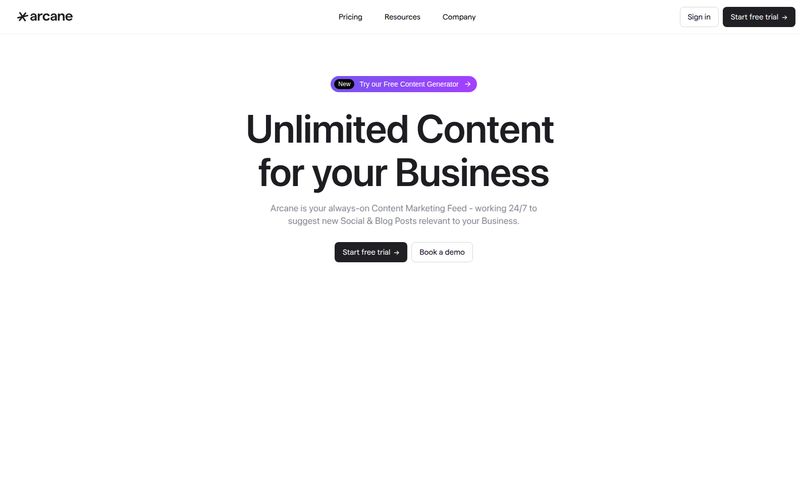The life of an SEO pro can feel like you're trying to juggle flaming torches while riding a unicycle. You've got one tab open for keyword research, another for your content editor, a third for a site audit tool, a fourth for rank tracking... and about fifteen others just for good measure. It’s a chaotic symphony of subscriptions and dashboards. So, when another “all-in-one AI platform” pops up, my first reaction is usually a healthy dose of skepticism mixed with a whole lot of fatigue.
But then I stumbled upon Search Atlas. And I have to admit, my curiosity got the better of me. The tagline on their site, "Let Your SEO Work Smarter, Not Harder WITH AI," didn’t promise to replace me. It promised to work with me. That small distinction was enough to make me lean in a little closer.
So, I rolled up my sleeves and spent some quality time with the platform. Is it the magic bullet that will finally let us put our feet up? Or is it just another shiny object in the ever-expanding universe of SEO tools? Let’s get into it.
So What Exactly Is Search Atlas?
In a nutshell, Search Atlas is trying to be the central command center for all your SEO and content marketing operations. It's a suite of tools, powered by a hefty dose of artificial intelligence, designed to streamline everything from finding the right keywords to building out entire campaigns. Think of it as an attempt to merge the best parts of Ahrefs, SurferSEO, and maybe even a dash of Jasper, all under one roof.
The core of the platform revolves around its AI assistant, cheekily named OTTO. OTTO is positioned as your tireless digital intern, handling the tedious, repetitive tasks that eat up so much of our day. We're talking about automating technical optimizations, generating content briefs, and even creating Google Ads campaigns. It's an ambitious promise, for sure.

Visit Search Atlas
A Look Under the Hood: The Core Features
An all-in-one platform is only as good as its individual parts. If the keyword tool is weak or the content editor is clunky, the whole thing falls apart. Here's my breakdown of what's inside Search Atlas.
The AI Content Creation Suite
This is where things get interesting. Search Atlas has a full-fledged content editor that feels familiar if you've used other optimization tools. It analyzes top-ranking pages for a target keyword and gives you suggestions on terms to include, word count, readability, and structure. So far, so standard.
Where it stands out is the "1-Click Content" feature. The idea is you pop in a keyword, and it generates a whole, SEO-optimized article. Now, I've always been wary of AI writers. They can produce text that's grammatically correct but soulless. In my experience with this, the output is a surprisingly solid first draft. It's not something I'd copy-paste and publish immediately, but it's a fantastic starting point that can save hours of outlining and initial research. It gets the bones of the article in place, and then you, the human expert, come in to add the soul, the stories, and the unique insights.
OTTO: Your AI Automation Co-Pilot
This is the real showstopper, in my opinion. OTTO SEO is the automation engine. The image on their site lists a bunch of things it can automate, like Google Search Console setup, sitemap submission, schema markup implementation, and internal linking suggestions. For an agency managing dozens of client sites, this is huge. It's the grunt work that has to be done but that no one enjoys doing. Automating this frees up your team to focus on actual strategy, client communication, and creative link-building—the stuff that really moves the needle.
They also have OTTO Google Ads, which aims to do the same for your CPC campaigns. It helps create ad copy, set up campaigns, and target audiences. It's a bold addition that shows they're thinking beyond just organic search.
The Full SEO Toolkit
Of course, it also has the foundational tools you'd expect. A keyword research tool that helps you find new opportunities. A site audit tool to crawl your site and flag technical issues. A rank tracker to monitor your positions in the SERPs. And tools to help with link building and local SEO, including GMB-focused projects. Having all of this integrated means the data can talk to each other, which is a big plus. Your rank tracking can inform your content strategy, which is then checked by your audit tool. It’s a cohesive ecosystem.
Okay, But Is the AI Actually Any Good?
This is the million-dollar question, isn't it? We've all been burned by AI promises before. My take? The AI in Search Atlas is best thought of as a powerful apprentice. It’s incredibly fast and knowledgeable, but it lacks real-world experience and strategic intuition. It can build the car, but you still need to be the one to drive it.
"Relying solely on AI to run your SEO is like letting a GPS drive your car off a cliff because the map is outdated. You still need a hand on the wheel."
The AI is brilliant for data processing and pattern recognition—tasks that humans are slow at. It can analyze thousands of data points to tell you what a top-ranking article should look like. But it can’t tell you the why. It doesn’t understand user intent with the same nuance a human can. So yes, the AI is good. Very good, in fact. But its not a replacement for a skilled SEO professional. It’s a force multiplier.
Let's Talk Money: Search Atlas Pricing
Alright, let's get down to brass tacks. Is this thing affordable? Well, that depends on who you are. The pricing structure is clearly aimed at professionals and agencies, not so much the hobbyist blogger.
Here’s a quick rundown of their plans:
- Starter: $99 per month. Aimed at solo marketers and freelancers. Gives you the core tools to get going.
- Growth: $199 per month (I've also seen it listed at $249, so there might be promotional pricing in play). This is for small agencies and mid-size businesses, with higher limits and more features.
- Pro: $399 per month. Designed for agencies ready to scale up their operations significantly.
- Enterprise: Contact for a quote. This is for large organizations needing custom solutions.
A crucial point is that the OTTO SEO automation is an add-on priced per site, with discounts as you add more sites. This makes sense, as it allows you to scale the cost directly with your client load. At first glance, $99 or $199 a month might sound steep. But if you add up the cost of a premium keyword tool ($99/mo), a content optimization tool ($59/mo), and a rank tracker ($49/mo), you're already past the cost of the Growth plan. So for agencies, it could actually represent a cost saving.
The Good, The Bad, and The AI
No tool is perfect. After spending time with Search Atlas, here's my honest breakdown of the pros and cons.
What I Liked
First off, the all-in-one approach is genuinely convenient. Not having to switch between five different tools is a workflow improvement I can't overstate. The automation potential of OTTO is a game-changer for agency efficiency. And the white-label reporting option is a must-have for any agency that wants to present professional, branded reports to clients without spending hours in Canva. The free onboarding and support is also a nice touch, helping to flatten teh learning curve a bit.
What Gives Me Pause
The price tag will definitely be a barrier for some, especially those just starting out. It's an investment. Also, while the UI is pretty slick, some of the more advanced features do assume a certain level of technical SEO knowledge. This isn't really a tool for absolute beginners to learn SEO from scratch. Finally, as mentioned, the reliance on AI requires a critical eye. You have to be willing to review and refine its suggestions, not just accept them blindly.
Frequently Asked Questions About Search Atlas
Is Search Atlas a complete replacement for Semrush or Ahrefs?
For many users, especially content-focused agencies, it could be. It covers most of the same ground: keyword research, site audits, content optimization, and rank tracking. Power users who live inside the deep backlink analysis tools of Ahrefs might still want to keep their subscription, but Search Atlas makes a very strong case for being the primary, day-to-day platform.
How much human work does OTTO SEO really need?
You should think of OTTO as an executor, not a strategist. You still need to set the strategy and approve its actions. For example, it might suggest adding schema markup, but you need to verify it's the right schema for that page. It handles the 'doing', but you still need to do the 'thinking'.
Is the 1-Click AI content ready to publish?
I would strongly advise against it. The AI content is a fantastic, high-quality first draft that can save you 70-80% of the initial writing time. However, it still needs a human touch to add unique perspectives, personal anecdotes, brand voice, and to fact-check any specific claims. Always edit and enrich AI-generated content.
What is the white-label feature for agencies?
White-labeling allows an agency to use the Search Atlas platform and its reporting features but brand them as their own. When you send a report to a client, it will have your agency's logo and branding, not Search Atlas'. It’s a professional touch that makes your agency look more established.
Does Search Atlas offer a free trial?
The website has several buttons that say "Start for Free" or mention free projects, which typically lead to creating an account with limited access or a demo. It seems they favor a freemium or demo model over a traditional time-limited free trial for the full suite, which is common for platforms at this scale.
Final Verdict: Should You Invest in Search Atlas?
After diving in, I'm walking away cautiously optimistic. Search Atlas isn't just another tool; it feels like a glimpse into the future of how SEO work gets done. It's a thoughtfully designed platform that understands the real pain points of digital marketers and agencies.
Is it for everyone? No. If you're a small blogger or a business with a tiny marketing budget, it's probably overkill. But if you're a freelancer, a growing agency, or an in-house team struggling to scale your efforts, Search Atlas presents a very compelling value proposition. It’s an investment in efficiency.
The key is to go in with the right mindset. Don't expect a magic robot to do your job for you. Instead, see it as the ultimate co-pilot, one that can handle the navigation and system checks, freeing you up to actually fly the plane. And in the turbulent skies of SEO, having a reliable co-pilot can make all the difference.



